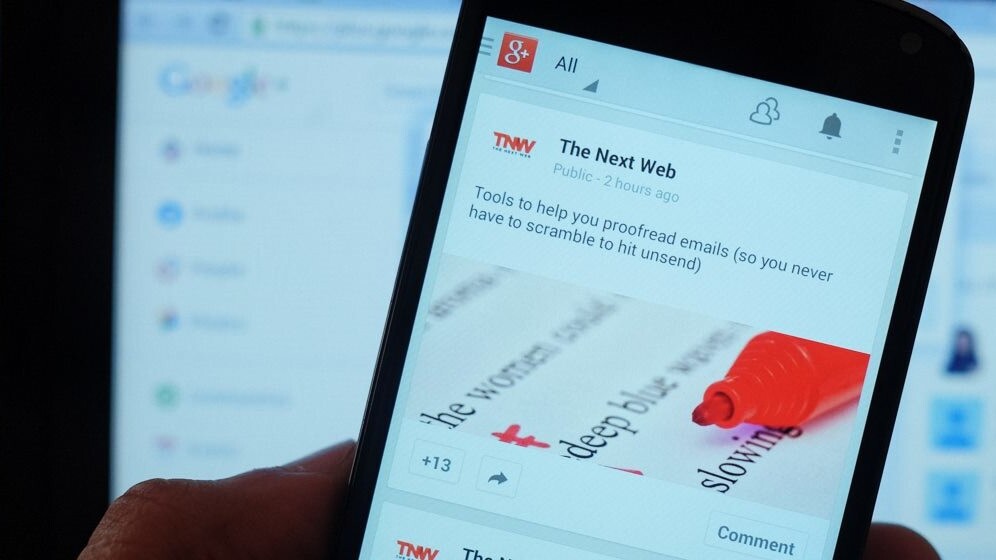
Google+ is undoubtedly an important channel for both individuals and organizations of all sizes to be active on, since it’s the social backbone of all of Google’s properties from Gmail to search.
Not to mention, that there’s 300 million monthly active users on Google+ to date.
Therefore, the use of Google+ can potentially help increase your visibility in Google search, as well as highlight your most recent post from the social network in Gmail or at the top of the search results.
However, many businesses are still having a hard time trying to gain traction on Google+ as compared to other social networks. Obviously, some of the fastest growing pages on Google+ are YouTube, Android, Google, Google Maps and other Google owned properties, but how can a regular business look to duplicate their success.
A few companies have found the right formula to developing a rewarding community on the platform, but it doesn’t appear to be as easy of a process as it is to build a network of supporters on a Facebook page, Twitter account or Instagram.
To help demystify the strategies that work on Google+, here’s what three organizations from very different industries have done to find success on the social network.
1. Be platform agnostic and focus on compelling visual content
The American Red Cross is one of the most successful non-profits on Google+ today. The non-profit consistently shares interesting content related to their services and community involvement that often resonates with its audience through widespread interaction on the platform.
“Our philosophy and strategy is platform agnostic, so, it can tie into many different platforms,” said Curtis Midkiff, Director of Social Engagement at the American Red Cross.
According to Midkiff, this philosophy is to craft a visually focused story about the Red Cross and to engage with people that support the organization’s ongoing mission.
The Red Cross has found success by applying this strategy across each social network and adapting it to suit the nuances and audiences unique to each channel.
It found that visuals tend to receive the highest amount of interactions from its audiences, such as photos from events and volunteers, infographics illustrating the need for more blood donations, and repurposed YouTube videos.
One of the most unique aspects of Google+ is that it is tied into an ecosystem, whereas some of the other social platforms are their own standalone communities, says Midkiff.
His advice for other non-profits is to use visuals and other engaging content to drive interactions with your audiences to eventually take advantages of the larger Google+ ecosystem.
Lastly, he recommends that in order to find success with a platform like Google+ make sure your organization has the manpower or infrastructure in place to continually maintain the social network. Without this infrastructure, your organization will have hard time updating and tending to your Google+ page enough to find the success you’re looking for.
“Our social engagement team takes great effort to make sure we are cultivating communities, not necessarily networks,” said Midkiff.
2. Know your customer’s preferences and follow trends
Topman is a fashion brand that has found success on Google+ by deeply understanding its customers’ preferences and interests. Today, close to one million people have added the British fashion company to their circles in order to subscribe to the retailer’s messaging.
Topman’s Google+ page consistently share photos and links to top selling products, music related content, stylized outfits, GIFs, memes and more to entertain its audience.
“It’s important to not only push product, but trying to keep engaging customers as you would on your own personal Google+ page,” said Guillaume Brocart, Senior Digital Marketing Manager at Topman.
That’s one of Topman’s two main approaches to Google+: sharing content based on its customers’ interests as they relate to the brand and following trends on the social network.
“It’s one page for everything that is happening on the Topman Generation, which for us is a lot about music, film and fashion, added Brocart. You need to understand your customer.”
Sharing a weekly look at the most fashionable men from Instagram, an interview with the band Howler and outfit suggestions for the weekend is the type of content that the Topman customer base wants to see. As such, the brand continues to deliver in order to drive interactions on its posts and more conversations about the brand.
Topman has experimented with occasionally posting trending memes or GIF’s to show another side to the brand every Friday. This helps vary the content it is sharing, and allows the brand to jump on trending content to increase its audience growth.
Topman has also seen great success live streaming its past fashion shows on Google+, but what other businesses can more easily emulate is the brand’s approach to customer service using Google+ Hangouts. To help customers build an outfit or find what they’re looking for, Topman’s personal shoppers will join you on a Google+ Hangout to discuss how it can help perfect your wardrobe with its expert suggestions and advice.
Brocart suggests their presence on Google+ is all about one thing, “giving them a reason to come back, not just for offers but also for great content,”
3. Listen before speaking and build communities
Many businesses get it wrong on social media since they insist on talking as opposed to consistently listening to what their audience has to say to inform the company’s future messaging. Cadbury is one of the most successful businesses on Google+ today, one reason being that it really listens to its audience from the very beginning.
Jerry Daykin, Cadbury’s Social Media Marketing Manager, said that before even beginning its Google+ page, the team monitored the activity of users and other pages on the network to see how they’d best fit it.
“We did searches on Google+ for quite a while before our pages were launched and every day we saw people were talking about Cadbury and chocolate and the Olympics. So there was already a platform where conversations relevant to us were happening; we were just able to step in and be a part of them in a positive way,” said Daykin in the Google+ case study.
Listen to what your audiences is saying about your industry and cater your company’s approach to these conversations. Follow trends occurring on Google+ and react to them as they relate to your business – this way, you’re engaging in relevant conversations and involving your unique perspective on the topic.
Cadbury has also been extremely successful at using Google+ communities to drive more conversation about the brand and create a real community around specific segments of their audience.
With over 20,000 posts from the brand and members, the ‘Cakes & Baking – The Cadbury Kitchen’ community boasts over 100,000 members and drives conversation daily about desert recipes, ideas and suggestions.
This page heavily features content created by the community of active users, but also highlights content created specifically for the audience in the community and content used on their main Google+ page as well.
Closing thoughts
Decide whether it’s in your company’s best interest to create your own niche community about a topic in your industry related to your business, or whether it’s more effective to become an active contributor to a few existing communities relevant to your audience. Both approaches to Google+ communities can help your business be more effective as mastering the social network.
What have you seen work for a Google+ page? Do you think Google+ is important for your business? How do you plan to grow your audience on the network?
Share your thoughts in the comments below.
Get the TNW newsletter
Get the most important tech news in your inbox each week.







